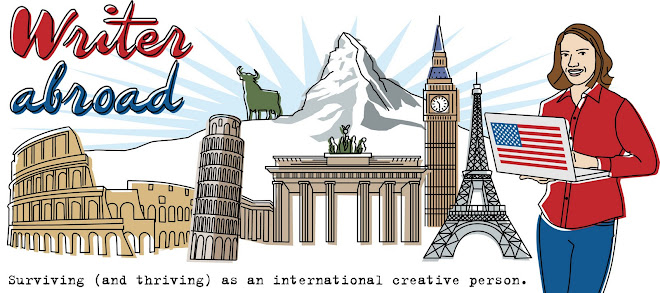Writers usually think
about characters, stories, and content. They don’t usually
think about business entities. But when it comes to how you work, it’s
important to consider the advantages and disadvantages of various entities you
could create for your writing business.
With this in mind, Writer Abroad has
created a little cheat sheet for writers like her who are not business people. So read and consider, but then talk to an accountant or tax
lawyer about your specific situation based on your country, city, and state to
see what makes sense for you. Writer Abroad has been both a sole proprietorship
and an S-Corp, so she knows first hand that there are advantages and
disadvantages to having a writing business in either entity.
 |
Become a CEO of your writing corporation–
and still wear your slipper boots. |
Sole Proprietorship
If you
write an article or do a project for someone and get paid for it, you are automatically considered a sole proprietor.
Benefits:
-It's the simplest entity: No
official incorporation paperwork required (or fees to do so!)—just start
working.
-You can deduct
any expenses related to your work—including a portion of your monthly mortgage
or rent payment if you work from home and have a designated office.
-You can
create a Solo 401k and deduct up to 18k in retirement a year.
-You can
deduct net business losses from personal income.
Downsides:
-Your
personal and business lives are intertwined legally, meaning if someone takes
you to court for something you wrote, your personal assets are also at stake.
-Self-employment
taxes (U.S.) are over 15%. That’s on top of paying the tax in your income
bracket. The first time you see your total tax bill as a sole proprietor, you
will be shocked.
-Might not
be the most tax advantageous entity if you make above a certain income (say 30k
or more).
LLC
Benefits:
-Your profits
pass through and taxes are paid personally.
-Your business
is legally separated from your personal financials.
Downsides:
-More
expensive to establish than a sole proprietorship (but worth considering for the legal protection it offers.)
S-Corporation
An
S-Corporation is a special kind of corporation where business income, as well
as many tax deductions, credits, and losses are passed through the owners,
rather than being taxed at the corporate level. You must meet specific IRS
requirements to create an S-Corp. First you file regular corporation paperwork, then you apply to be an S-Corp after that.
Benefits:
-Your
business will be legally separated from your personal finances.
-If you
make over a certain income level, you will save money on taxes because you
won’t be paying 15% in self-employment taxes like a sole proprietor does. So someone making 100k, for example,
could save around 5k in taxes. But you have to consider the costs of increased paperwork
too.
-You have
more flexibility. You can decide how much salary you get, how much retirement
you put away (in some cases, you can deduct as much as 52k a year), and you have a
lot of the benefits a regular corporation has, but on a smaller scale and without double
taxation.
-You demonstrate your seriousness about your writing both to yourself and to others with a corporation.
-You'll become both a writer and a CEO. Sounds good at parties.
-You can hire employees or contractors like editors, book designers, translators, and more.
Downsides:
-You will need
to hire a lawyer to help you incorporate. This can cost around $700.
-Yearly
filing fees of $100 or more are required to maintain entity with the state.
-You will
have a lot of increased paperwork and accounting, which means you may need to
hire an accountant to help you manage payroll (even if it’s just you on
payroll), taxes, and quarterly filings as well as things you never considered,
like state employment security paperwork, which is filed quarterly too (and can
cost around $400-500 a quarter just to insure yourself against unemployment). Try to get a CPA as they are the most qualified to do your accounting. Figure an accounting cost of about $130 a month, including a subscription to Intuit.
For further reading
Writer Abroad found the following books useful when she was determining her business entity:
Other writers have questions or entity experiences? Leave a comment.








